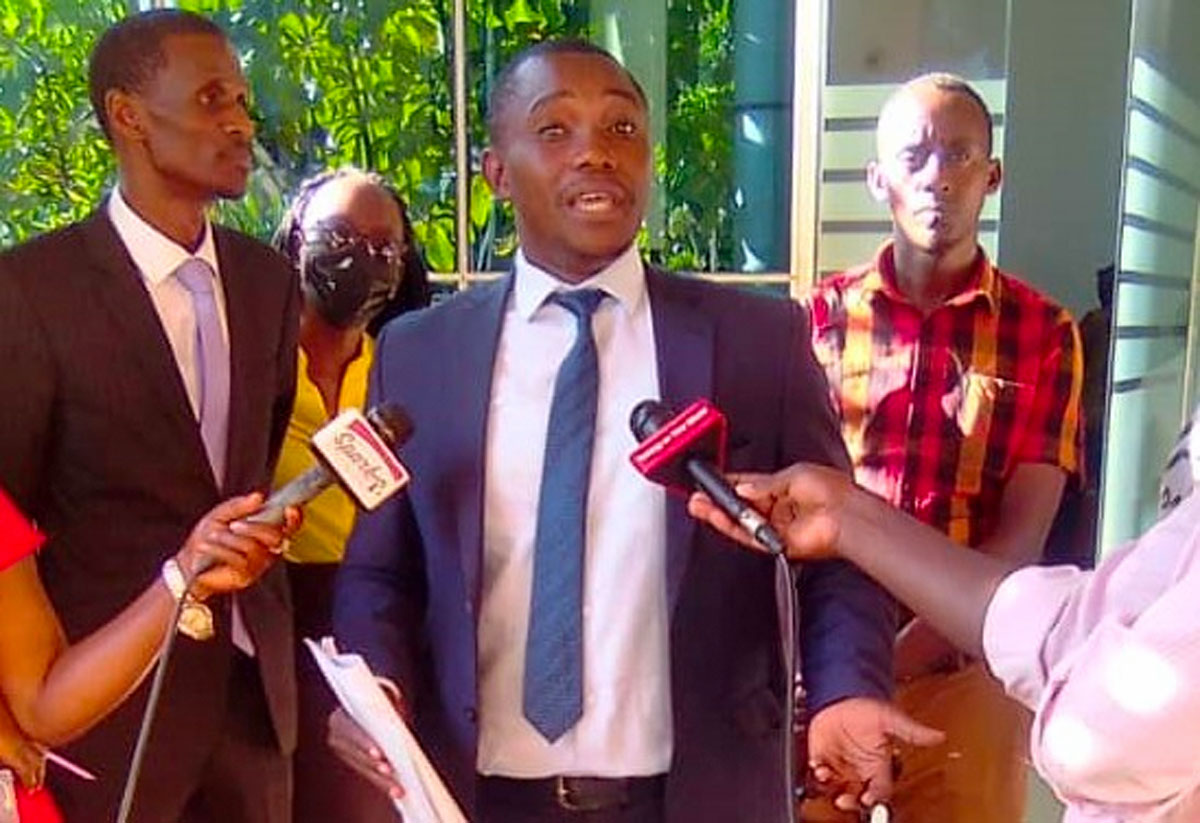
Dr. Adrian Jjuuko, executive director of HRAPF, speaks to the media on May 29 in Kampala, Uganda, after filing a petition seeking to nullify the entire Anti-Homosexuality Act 2023. (Gloria Nakiyimba photo courtesy of Capital Radio)
U.S. officials are preparing for possible travel restrictions and foreign aid cutbacks in response to Uganda’s cruel new Anti-Homosexuality Act, signed by President Yoweri Museveni on Monday. Those sanctions have not yet been imposed, nor has the new Ugandan law taken effect. First it needs to be published in the official Ugandan gazette and must survive a constitutional challenge by human rights defenders.
The gay-friendly Ugandan legal advocacy group HRAPF (Human Rights Awareness and Promotion Forum) promptly filed such a challenge late Monday. In 2014, Uganda’s Constitutional Court struck down a previous anti-homosexuality law on technical grounds.
This time, HRAPF executive director Adrian Jjuuko stated:
“The bill, by criminalizing what we call consensual same-sex activity among adults, basically goes against key provisions of the constitution including violating the right to equality and non-discrimination,(Article 20& 21) of the Constitution, the right to dignity which is under (Article 24) of the constitution, the right to liberty of Ugandans under (Article 23) the right to privacy of every individual under (Article 27) and the right to health. Basically we are failing in our own obligations towards the pushing back on HIV/AIDS by passing such a law that make LGBT people to hide behind the scenes and that makes us fail in our fight against HIV/AIDS.”
Capital Radio reported that “Among the petitioners are senior journalist Andrew Mwenda, Honorable Fox Odoi, university professor Sylvia Tamale, Dr. Busingye Kabumba from the School of Law at Makerere University, feminist Solome Nakaweesi Kimbugwe, as well as human rights activists Dr. Frank Mugisha, Erick Ndawula, Kasha Jackeline Nabageseera, Richard Smith Lusimbwe, and Williams Apako.”
Meanwhile, U.S. President Joe Biden stated:

U.S. President Joe Biden. (Photo courtesy of BBC News)
“This shameful Act is the latest development in an alarming trend of human rights abuses and corruption in Uganda. The dangers posed by this democratic backsliding are a threat to everyone residing in Uganda, including U.S. government personnel, the staff of our implementing partners, tourists, members of the business community, and others.
“As such, I have directed my National Security Council to evaluate the implications of this law on all aspects of U.S. engagement with Uganda, including our ability to safely deliver services under the U.S. President’s Emergency Plan for AIDS Relief (PEPFAR) and other forms of assistance and investments.
“My Administration will also incorporate the impacts of the law into our review of Uganda’s eligibility for the African Growth and Opportunity Act (AGOA). And we are considering additional steps, including the application of sanctions and restriction of entry into the United States against anyone involved in serious human rights abuses or corruption.”
But Biden also emphasized the importance of the U.S.-Uganda relationship:
“The United States shares a deep and committed partnership with the people of Uganda. For more than 60 years, we have worked together to help millions of Ugandans live healthier, more productive lives.
“Our programs have boosted economic growth and agricultural productivity, increased investments in Ugandan businesses, and strengthened our trade cooperation. In total, the U.S. Government invests nearly $1 billion annually in Uganda’s people, business, institutions, and military to advance our common agenda. The scale of our commitments speaks to the value we place on this partnership—and our faith in the people of Uganda to build for themselves a better future. It is my sincere hope that we can continue to build on this progress, together, and strengthen protections for the human rights of people everywhere.”
The Voice of America reported on the U.S. response:
Top US Diplomat Calls Uganda’s Anti-Gay Law a “Broader Degradation of Human Rights”
KAMPALA — U.S. Secretary of State Antony Blinken has ordered his agency to update its travel guidance to Uganda in the wake of the east African nation’s approval of a draconian new anti-homosexual law.
In a statement released late Monday, Blinken said he has also ordered State Department officials to consider using existing restrictions tools against Ugandan officials and other individuals “for abuse of universal human rights, including the human rights of LGBTQI+ persons.”

U.S. Secretary of State Antony Blinken (Alexandros Michailidis photo courtesy of PNS.org/Shutterstock)
The top U.S. diplomat says Uganda’s “failure to safeguard the human rights of LGBTQI+ persons is part of a broader degradation of human rights protections that puts Ugandan citizens at risk and damages the country’s reputation as a destination for investment, development, tourism, and refugees.”
Members of Uganda’s LGBTQ community were in shock following the enactment of the Anti-Homosexuality Act, signed into law Monday by President Yoweri Museveni. They called for its repeal and filed a notice Monday with the country’s attorney general about their intention to bring the matter to court. …
EU foreign policy chief Josep Borrell said Monday the measure is “contrary to international human rights law” and will affect Uganda’s ties with international partners.
“The Ugandan government has an obligation to protect all of its citizens and uphold their basic rights. Failure to do so will undermine relationships with international partners,” he said.
Canada’s Foreign Minister Melanie Joly called the law “abhorrent, cruel and unjust,” while the British government said it was “appalled” by the measure, according to Andrew Mitchell, Britain’s minister of state for development and Africa. …
International bodies that operate in Uganda, such as UNAIDS and USAID, have previously stated that the passage of the Anti-Homosexuality Act will not only complicate their work there, but reverse the gains made by the country in the fight against HIV/AIDS.
COMMENTS